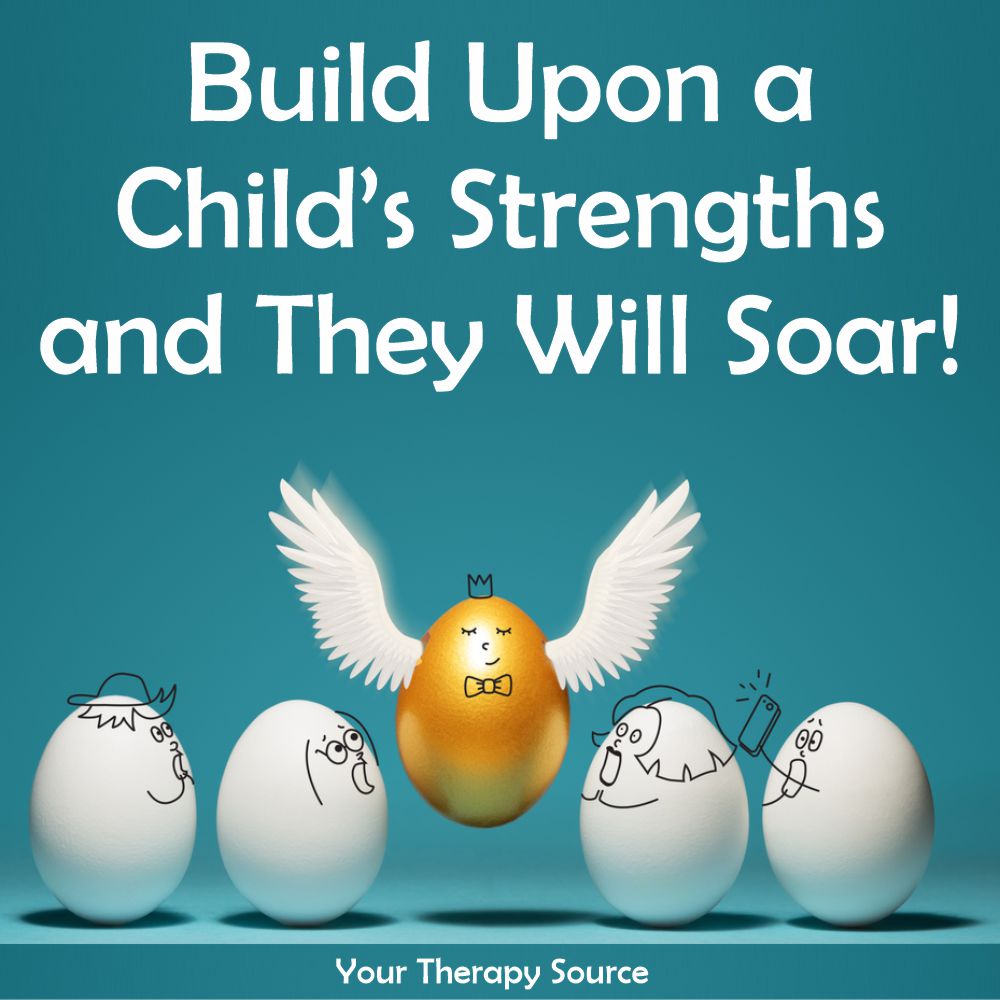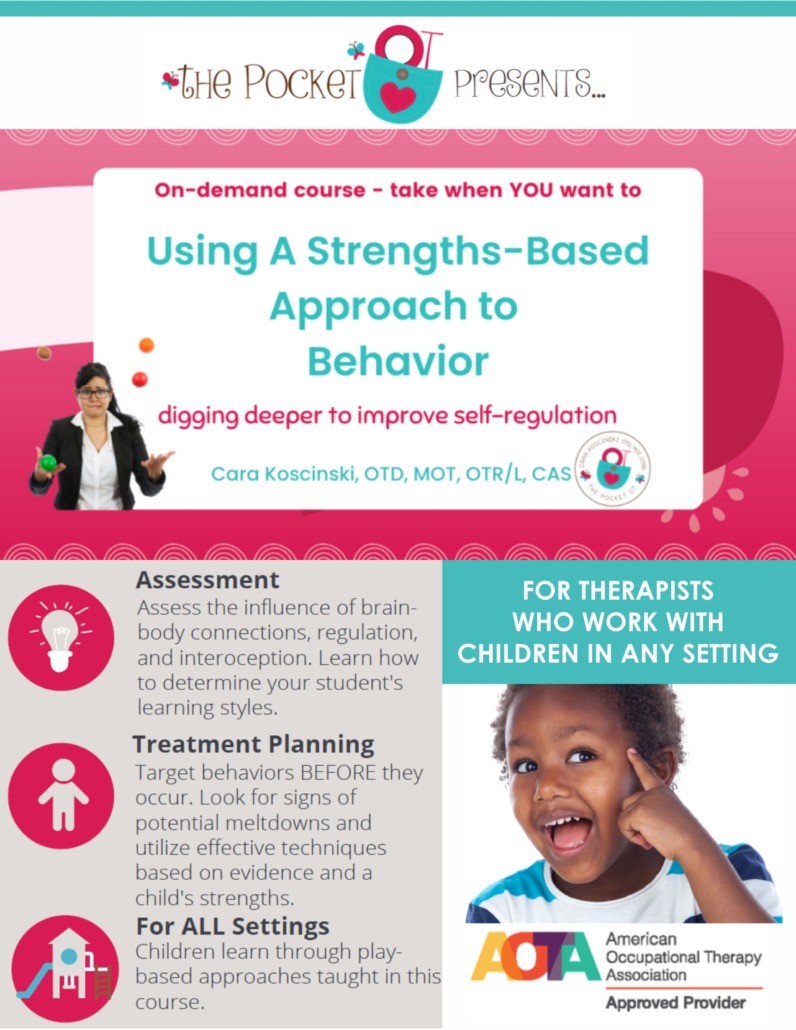Child’s Strengths
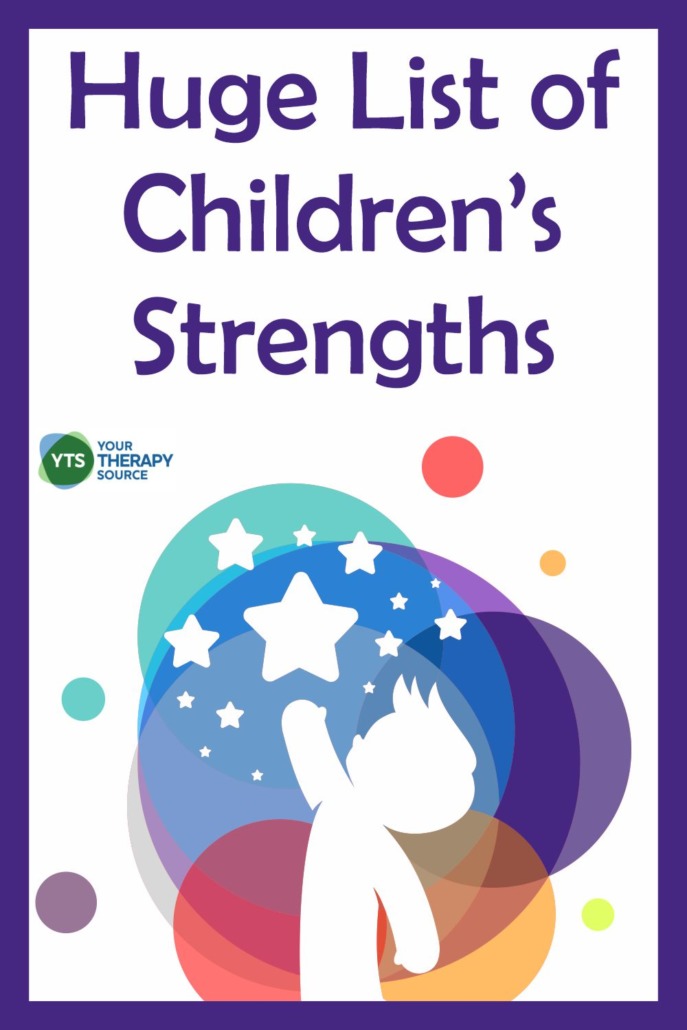
Every child is unique and has their own strengths. As teachers, therapists, and parents, it’s important to know about a child’s strengths so that you can help children to grow and thrive. Sometimes, all it takes is a little knowledge and encouragement to help children shine.
Each of these categories of strengths can be nurtured and developed with time and effort. So don’t forget to celebrate your child’s unique talents – they’re the key to their success! When we know the strengths of a child, we can help improve their weaknesses.
If you want to dive deeper to answer the question, “what are your child’s strengths?”, you can download a copy of this information as a strengths-based checklist for FREE at the bottom of this post.
You can download this for FREE at the bottom of this blog post.
TYPES OF STRENGTHS
There are many different types of strengths. From cognitive skills to character traits, this is what make us all individuals with strengths and weaknesses. This list simply provides examples to help discern the personal strengths of your students and children.
COGNITIVE STRENGTHS OF A CHILD
- Long term memory skills: A child with a great memory is often able to remember instructions, people’s names, and previous learning experiences easily. This child may do well in school and remember content for tests easily.
- Short term memory skills: A child with strong short term memory skills is often able to remember things for a short period of time, such as a list of items or a set of instructions.
- Working memory: This child is able to remember and process information at the same time. A child with strong working memory skills is often successful in school and can easily juggle multiple tasks.
- Sustained attention: A child who can sustain their attention is able to focus on a task for a long period of time.
- Selective attention: A child with selective attention skills is able to filter out distractions and focus on one task.
- Divided attention: A child who is able to divide their attention is able to focus on two tasks at the same time.
- Problem solving: A child who is good at problem solving is often able to find creative solutions to challenges.
- Logic skills: A child with strong logic skills is often able to see the connections between things.
- Reasoning: A child who is good at reasoning is often able to understand and think through complex problems.
- Visual processing: A child with strong visual processing skills is often able to easily understand and remember information that is presented visually.
- Auditory processing: A child with strong auditory processing skills is often able to easily understand and remember information that is presented verbally.
- Processing speed: A child with fast processing speed is often able to quickly understand, complete tasks, and remember new information.
- Language skills: A child with strong language skills is often able to easily understand and use spoken and written language.
- Critical Thinking: A child who is good at critical thinking is often able to see different sides of an issue and make logical decisions.
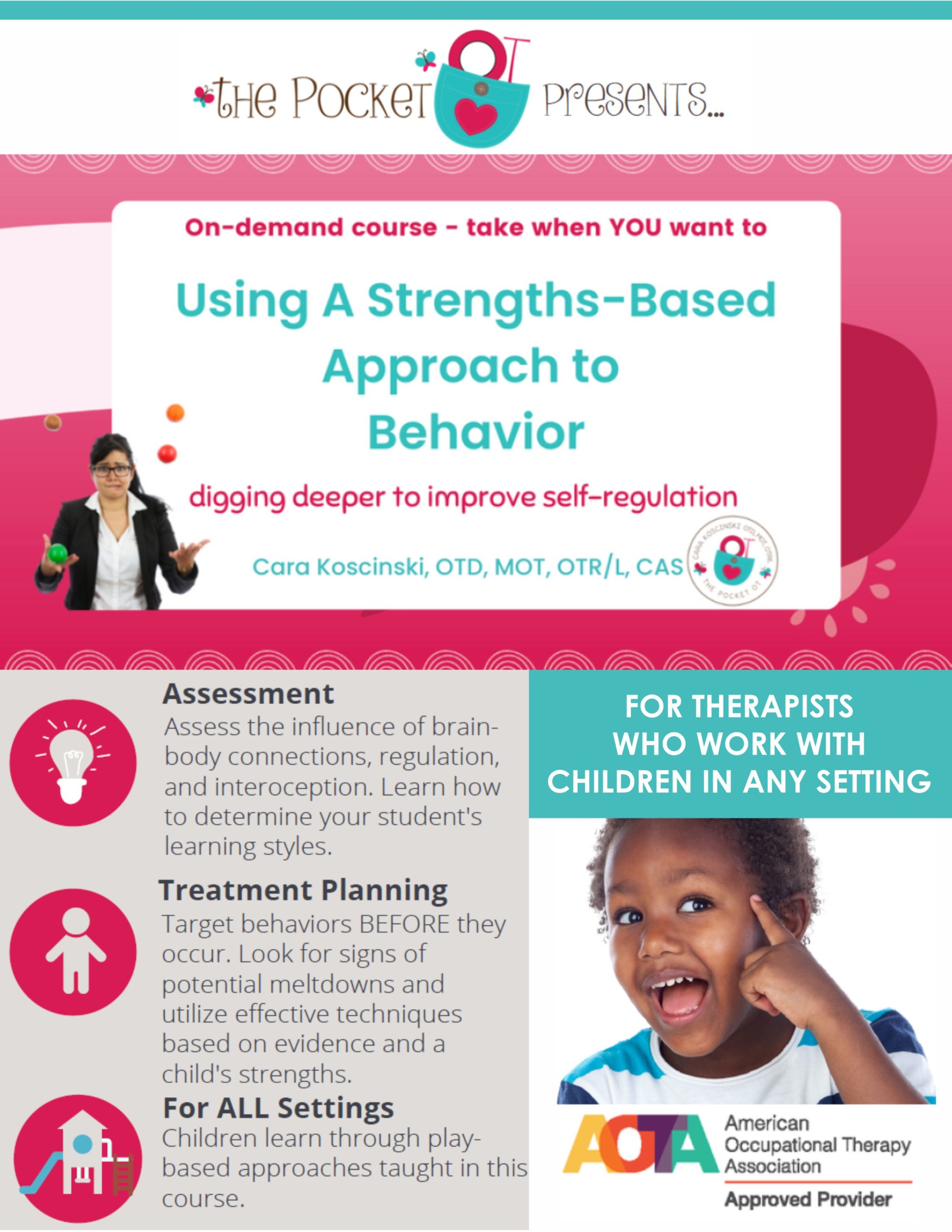
Using a Strengths-Based Approach to Behavior
CHILD’S STRENGTHS: ACADEMIC STRENGTHS
Reading skills: A child who is a strong reader is often able to read quickly and accurately. This child may also have a large vocabulary, good literacy skills, and be able to understand complex texts. Some students may have excellent reading comprehension while others are more fluent readers.
Writing skills: A child who is a strong writer is often able to express their thoughts and ideas clearly in writing. This child may also have a large vocabulary and be able to use complex sentence structure.
Math skills: A child who is strong in math is often able to understand and solve math problems quickly and accurately. This child may also be good at mental math, math facts, and have a strong understanding of math concepts.
Science skills: A child who is strong in science is often able to understand and remember scientific concepts. This child may also be good at experiments and have a strong understanding of the scientific method.
Social Studies skills: A child who is strong in social studies is often able to understand and remember information about people and events in history. This child may also be good at mapping and have a strong understanding of geography.
Study Habits: A child who has strong study habits is often able to focus and pay attention in class. This child may also be good at taking notes, completing assignments, and be able to study for tests easily.
Good Organizational Skills: A child who is organized is often able to keep track of their belongings and complete tasks on time. This child may also be good at planning and have a strong understanding of time management.
Planning Skills: A child who is good at planning is often able to think ahead and make decisions. This child may also be good at problem solving and have a strong understanding of cause and effect.
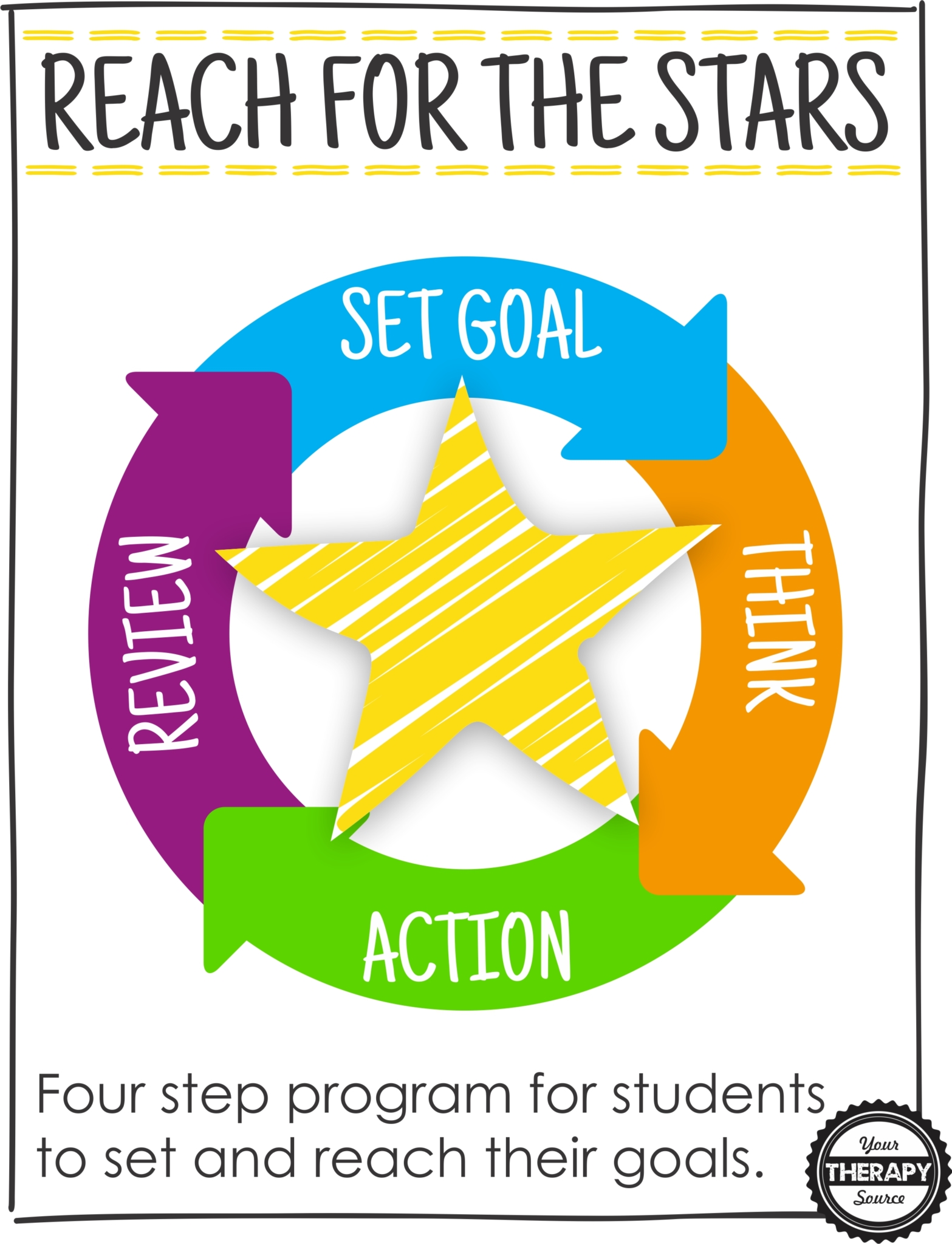
Goal Setting for Students PDF – Reach for the Stars
CHILD’S STRENGTHS: SOCIAL SKILLS STRENGTHS OF A CHILD
There are various ways to describe a child who has social strengths such as good friend, good communicator, and more!
Friendship skills: A child who is good at making friends is often outgoing and easy to get along with. Children can model being a good friend to others. This child may also be good at sharing and be able to compromise.
Communication skills: A child who is good at communication is often able to express their thoughts and feelings clearly. This child may also be good at active listening and be able to understand others.
Leadership skills: A child who is a good leader is often able to take charge and make decisions. This child may also be good at organizing and be able to motivate others.
Cooperation skills: A child who is good at cooperation is often able to work well with others. This child may also be good at following rules and be able to respect others.
Conflict resolution skills: A child who is good at resolving conflicts is often able to find a compromise that everyone can agree on. This child may also be good at mediating and be able to calm others down.
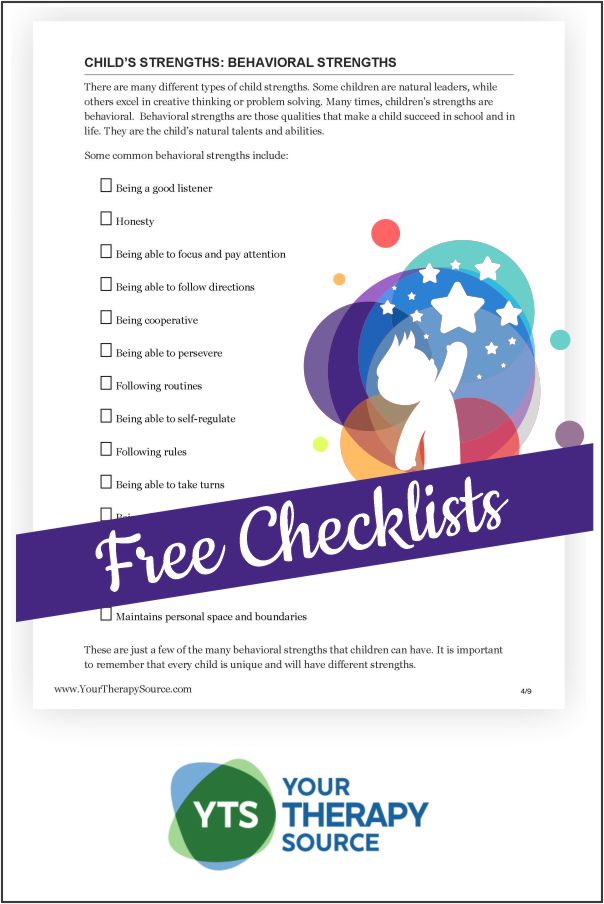
CHILD’S STRENGTHS: BEHAVIORAL STRENGTHS
There are many different types of child strengths. Some children are natural leaders, while others excel in creative thinking or problem solving. Many times, children’s strengths are behavioral.
Behavioral strengths are those qualities that make a child succeed in school and in life. They are the child’s natural talents and abilities.
Some common behavioral strengths include:
- Being a good listener
- Honesty
- Being able to focus and pay attention
- Being able to follow directions
- Being cooperative
- Being able to persevere
- Following routines
- Being able to self-regulate
- Following rules
- Being able to take turns
- Being able to share
- Takes pride in their work
- Following non-verbal cues
- Maintains personal space and boundaries
These are just a few of the many behavioral strengths that children can have. It is important to remember that every child is unique and will have different strengths.
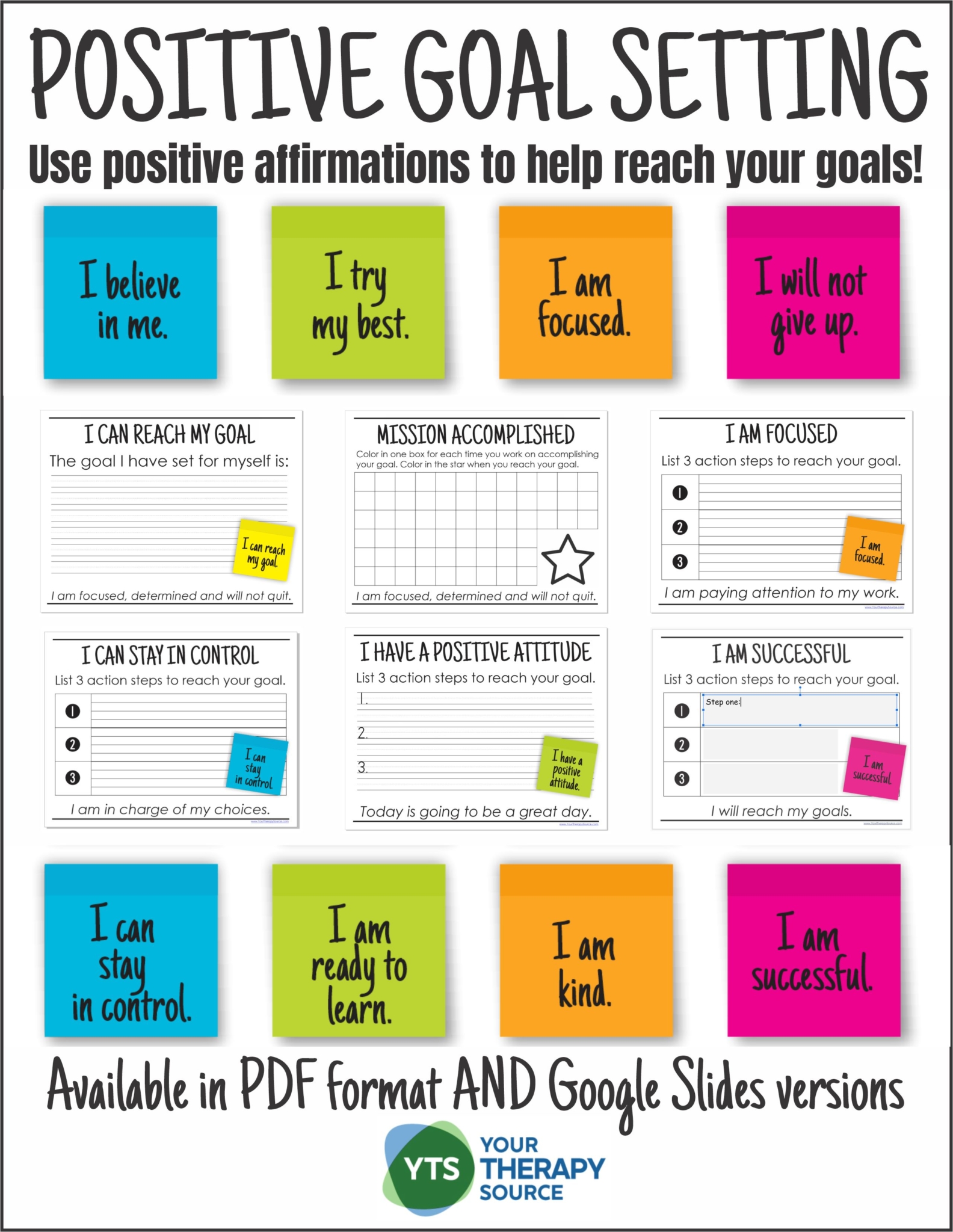
Positive Goal Setting
CHILD’S EMOTIONAL STRENGTHS
In addition to behavioral strengths, children also have emotional strengths. Emotional strengths are those qualities that help a child cope with stress and setbacks. They are the child’s inner qualities that allow them to regulate their emotions and stay positive in difficult situations.
Some common emotional strengths include:
- Optimism
- Resilience
- Flexibility
- Adaptability
- Positivity
- Creativity
- Curiosity
- Determination and more.
Read more about the Emotional Strengths of a Child.
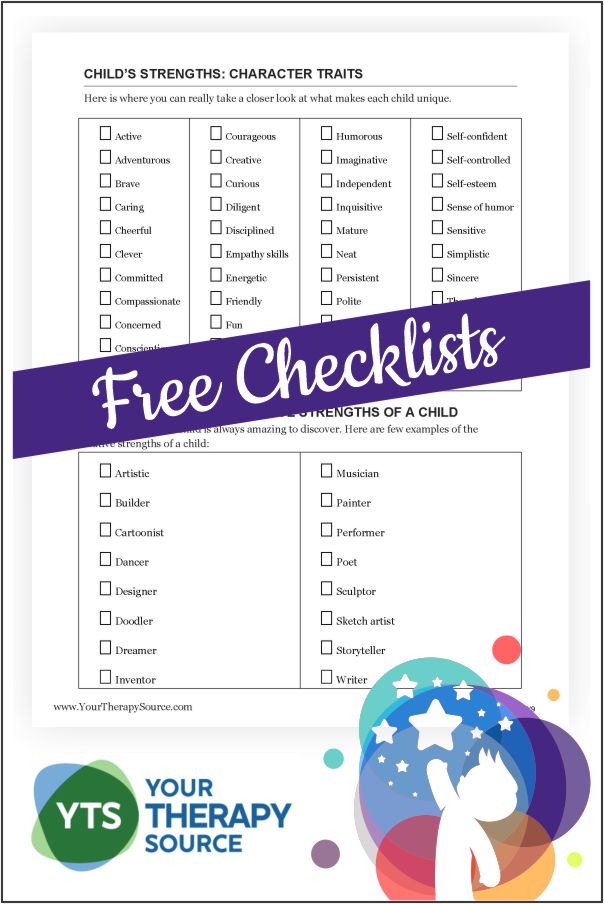
CHILD’S STRENGTHS: CHARACTER TRAITS
Here is where you can really take a closer look at what makes each child unique.
List of Character Traits
- Active
- Adventurous
- Brave
- Caring
- Cheerful
- Clever
- Committed
- Compassionate
- Concerned for others
- Conscientious
- Considerate
- Courageous
- Creative
- Curious
- Diligent
- Disciplined
- Empathy skills
- Energetic
- Friendly
- Fun
- Helpful
- Honest
- Humorous
- Imaginative
- Independent
- Inquisitive
- Mature
- Neat
- Persistent
- Polite / Good Manners
- Reliable
- Resourceful
- Responsible
- Self-confident
- Self-controlled
- Self-esteem
- Sense of humor
- Sensitive
- Simplistic
- Sincere
- Thoughtful
- Watchful
- Witty
- Zany
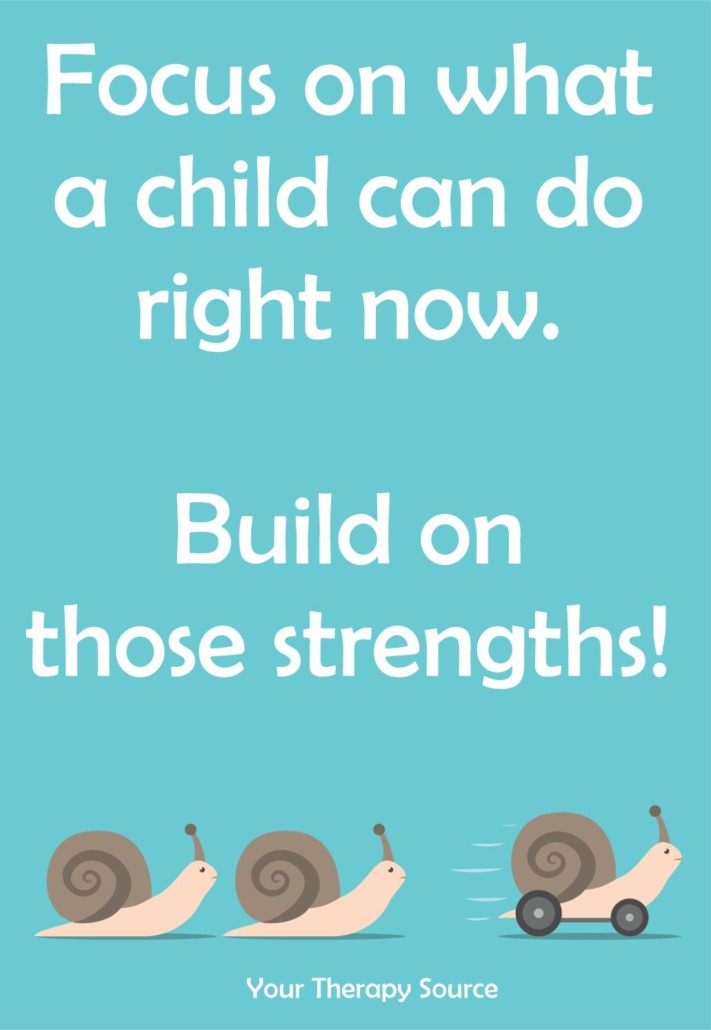
CHILD’S STRENGTHS: CREATIVE STRENGTHS OF A CHILD
The creative side of a child is always amazing to discover. Here are few examples of the creative strengths of a child:
- Artistic
- Builder
- Cartoonist
- Dancer
- Designer
- Doodler
- Dreamer
- Inventor
- Musician
- Painter
- Performer
- Poet
- Sculptor
- Sketch artist
- Storyteller
- Writer
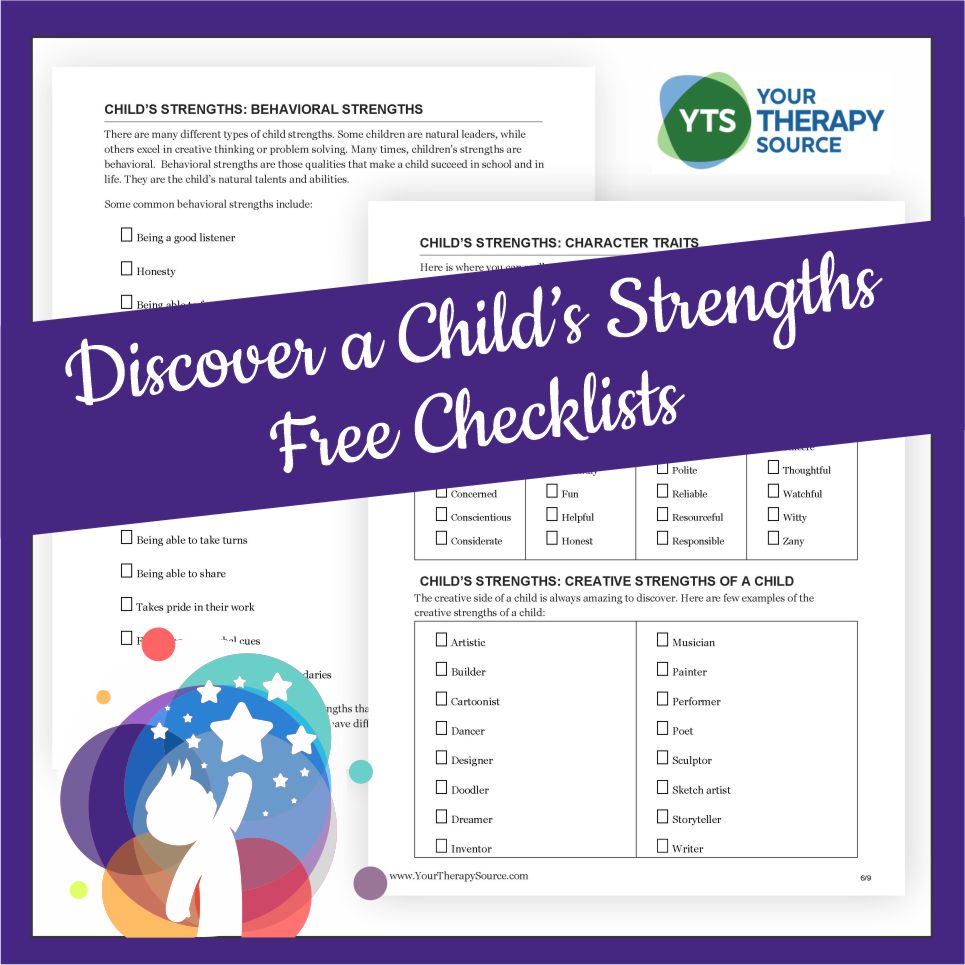
CHILD’S STRENGTHS: PHYSICAL STRENGTHS OF A CHILD
The physical side of a child is always amazing to discover and watch unfold as they mature and achieve new motor skills. Whether it be riding a bike, playing chess, or recess time, kids display physical strengths throughout the day.
Here are a few examples of the physical strengths of a child:
- Agility
- Athletic
- Balanced
- Body awareness
- Coordinated
- Efficient movement
- Endurance
- Fine motor skills
- Flexibility
- Gross motor skills
- Hand-eye coordination
- Power
- Reflexes
- Speed
- Stamina
- Strong
- Tough
DESCRIBING A CHILD’S STRENGTHS
When you are trying to identify the strengths of a child, it is important to look for evidence of these strengths in their daily life.
Some questions you can ask to help identify a child’s strengths include:
- What does this child do better than other children their age?
- What do other people say this child is good at?
- What does this child enjoy doing?
- In what areas does this child excel?
- What are this child’s natural talents and abilities?
- When does this child shine the most?
- What are this child’s inner qualities that allow them to cope with stress and setbacks?
Once you have identified the child’s strengths, you can then begin to build upon them. This is a necessary step for children with special needs or a disability when the IEP is created.
WHY IS IT IMPORTANT TO BUILD UPON A CHILD’S STRENGTHS?
It is important to build upon a child’s strengths because it will help them succeed in school and in life. When a child feels confident in their abilities, they are more likely to take risks and try new things. They are also more likely to persevere when they face challenges because they know they have the inner strength to overcome them.
Building upon a child’s strengths will also help them develop a growth mindset. A growth mindset is a belief that intelligence and abilities can be developed through hard work, good strategies, and practice. Children with a growth mindset believe that they can improve with effort, and they are more likely to take on challenging tasks and persevere when they face setbacks.
How can you help a child build upon their strengths?
Here are a few ideas:
- Encourage them to try new things and take risks.
- Display encouraging, motivational reminders to help your students believe in themselves.
- Praise their effort and persistence, not just their results.
- Provide opportunities for them to practice and improve their skills.
- Help them to see setbacks as learning opportunities.
- Encourage them to seek help from others when they need it.
When you know your child’s strengths, you can help them build on those strengths and reach their full potential. By focusing on their strengths, you can help your child feel confident and successful. Additionally, by helping your child build upon their strengths, you can set them up for success in school and in life.
WHAT CAN YOU DO TO LEARN MORE ABOUT BUILDING UPON A CHILD’S STRENGTHS?
Dig deeper to improve self regulation in your students with this course, Using a Strengths-Based Approach to Behavior, presented by Dr. Cara Koscinski OTD.
If you are struggling with your student or children, then learning how to use a strengths-based approach can be a real game changer.
Perhaps, you are juggling behavioral outbursts during your therapy sessions. When you shift your perspective and consider all behavior as communication, you can approach your sessions with confidence.
Regulation, sensory coding, interoception, reflex integration, top-down or bottom-up processing, and decreased communication all affect a child’s behavior.
WHAT ARE YOUR CHILD’S STRENGTHS? DOWNLOAD YOUR FREE CHECKLISTS HERE
If you want to explore this topic further, you can download a copy of this post in checklist format. Read through the various topics and check off areas of strength on the child’s strengths list. Remember as you go through the child’s strengths list. to answer questions such as: What do other people say this child is good at? – What does this child enjoy doing? – In what areas does this child excel? – What are this child’s natural talents and abilities? – When does this child shine the most?
Sign up below to receive the Your Therapy Source email and get access to this FREE download.
RELATED POSTS
LIST OF STUDENT STRENGTHS AND WEAKNESSES FOR IEP WRITING
EMOTIONAL STRENGTHS OF A CHILD
STUDENT STRENGTHS IN THE CLASSROOM – FIND THE POSITIVE
STILL NEED TO WRITE GOALS TO ADDRESS WEAKNESSES?
Here is a collection of posts that provide examples for IEP goals to address any areas of weakness. Just remember to build upon your student’s strengths when you decide on what interventions to use to help them to achieve their goals!
Daily Living Skills Goals and Objectives
